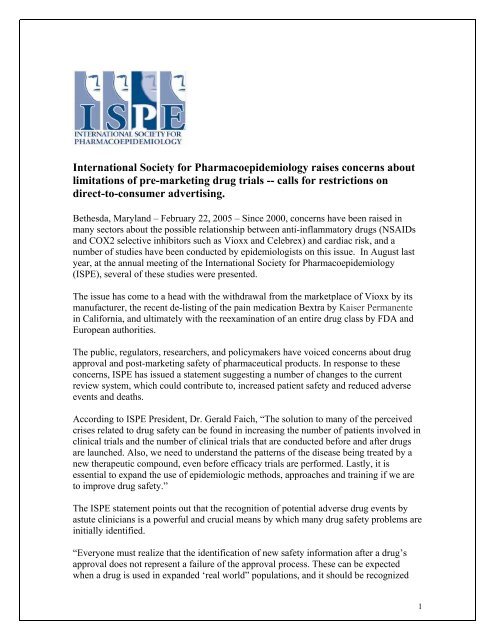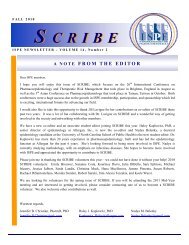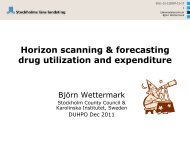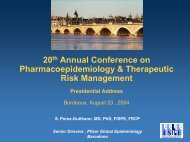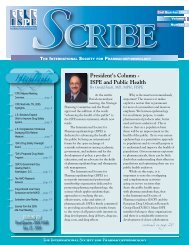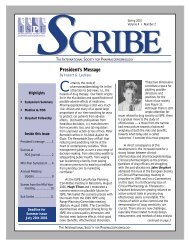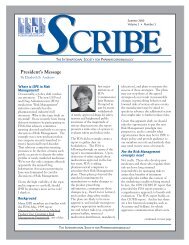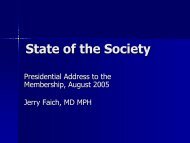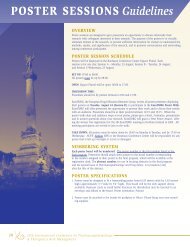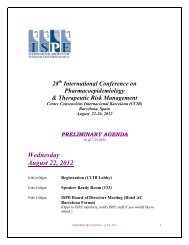International Society for Pharmacoepidemiology (ISPE)
International Society for Pharmacoepidemiology (ISPE)
International Society for Pharmacoepidemiology (ISPE)
You also want an ePaper? Increase the reach of your titles
YUMPU automatically turns print PDFs into web optimized ePapers that Google loves.
<strong>International</strong> <strong>Society</strong> <strong>for</strong> <strong>Pharmacoepidemiology</strong> raises concerns about<br />
limitations of pre-marketing drug trials -- calls <strong>for</strong> restrictions on<br />
direct-to-consumer advertising.<br />
Bethesda, Maryland – February 22, 2005 – Since 2000, concerns have been raised in<br />
many sectors about the possible relationship between anti-inflammatory drugs (NSAIDs<br />
and COX2 selective inhibitors such as Vioxx and Celebrex) and cardiac risk, and a<br />
number of studies have been conducted by epidemiologists on this issue. In August last<br />
year, at the annual meeting of the <strong>International</strong> <strong>Society</strong> <strong>for</strong> <strong>Pharmacoepidemiology</strong><br />
(<strong>ISPE</strong>), several of these studies were presented.<br />
The issue has come to a head with the withdrawal from the marketplace of Vioxx by its<br />
manufacturer, the recent de-listing of the pain medication Bextra by Kaiser Permanente<br />
in Cali<strong>for</strong>nia, and ultimately with the reexamination of an entire drug class by FDA and<br />
European authorities.<br />
The public, regulators, researchers, and policymakers have voiced concerns about drug<br />
approval and post-marketing safety of pharmaceutical products. In response to these<br />
concerns, <strong>ISPE</strong> has issued a statement suggesting a number of changes to the current<br />
review system, which could contribute to, increased patient safety and reduced adverse<br />
events and deaths.<br />
According to <strong>ISPE</strong> President, Dr. Gerald Faich, “The solution to many of the perceived<br />
crises related to drug safety can be found in increasing the number of patients involved in<br />
clinical trials and the number of clinical trials that are conducted be<strong>for</strong>e and after drugs<br />
are launched. Also, we need to understand the patterns of the disease being treated by a<br />
new therapeutic compound, even be<strong>for</strong>e efficacy trials are per<strong>for</strong>med. Lastly, it is<br />
essential to expand the use of epidemiologic methods, approaches and training if we are<br />
to improve drug safety.”<br />
The <strong>ISPE</strong> statement points out that the recognition of potential adverse drug events by<br />
astute clinicians is a powerful and crucial means by which many drug safety problems are<br />
initially identified.<br />
“Everyone must realize that the identification of new safety in<strong>for</strong>mation after a drug’s<br />
approval does not represent a failure of the approval process. These can be expected<br />
when a drug is used in expanded ‘real world” populations, and it should be recognized<br />
1
that post-marketing studies of safety and effectiveness are necessary because of the<br />
inherent and inescapable limitations of the drug approval process”, stated Dr. Faich.<br />
Despite calls in countries such as Canada <strong>for</strong> the reporting of all potential adverse drug<br />
events by manufacturers, healthcare professionals, and consumers, the <strong>ISPE</strong> believes that<br />
this would be counter-productive, and would overwhelm existing surveillance systems.<br />
The <strong>ISPE</strong> statement asserts that applying established epidemiology methods and<br />
techniques be<strong>for</strong>e and after a drug is approved and increasing the use of post-marketing<br />
observational studies are imperative to improving patient safety.<br />
“To achieve this, the whole research community, in the US <strong>for</strong> example, the NIH,<br />
Congress, AHRQ, FDA and others must recognize the importance of increased funding<br />
<strong>for</strong> epidemiological evaluation of therapeutic compounds, ” Dr. Faich insists.<br />
The <strong>Society</strong> also believes that most national regulatory agencies do not possess adequate<br />
authority to ensure that manufacturers conduct adequate post-marketing safety studies,<br />
including even those promised as a condition of drug approval, or to address potential<br />
safety issues that emerge post-approval.<br />
To be effective, regulatory agencies must have the authority to insist on the rapid<br />
implementation of pharmacoepidemiological safety studies to understand potential risks.<br />
The <strong>Society</strong> was critical, too, of the lack of coordination, cooperation and balanced<br />
resourcing between industry and regulatory bodies, and the administrative separation<br />
between bodies monitoring post-marketing safety and those conducting epidemiological<br />
studies.<br />
Significantly, since most drug safety crises occur in the first few years after approval.<br />
<strong>ISPE</strong> favors the cautious marketing promotion of products and recommends restricted<br />
direct-to-consumer (DTC) advertising <strong>for</strong> therapeutic products until safety in usage has<br />
been adequately demonstrated.<br />
<strong>Pharmacoepidemiology</strong> is the study of the use and effects of pharmaceuticals in<br />
populations, and is the scientific discipline underlying drug safety surveillance. The<br />
<strong>International</strong> <strong>Society</strong> <strong>for</strong> <strong>Pharmacoepidemiology</strong> (<strong>ISPE</strong>) is a global organization of over<br />
800 professionals interested in pharmacoepidemiology, pharmaceutical safety<br />
surveillance, and therapeutic risk management. As such, <strong>ISPE</strong> feels a responsibility to<br />
offer its views on existing systems <strong>for</strong> assuring pharmaceutical safety to interested<br />
policymakers, members of the public and others.<br />
The <strong>ISPE</strong> Statement on Regulatory Systems to Improve Pharmaceutical Safety was<br />
ratified by the Board of Directors and represents the consensus views of the society, and<br />
is intended to be broadly applicable across international boundaries.<br />
2
-30-<br />
For the Complete Statement see: www.pharmacoepi.org<br />
For in<strong>for</strong>mation:<br />
Mark H. Epstein, ScD<br />
Executive Secretary<br />
<strong>International</strong> <strong>Society</strong> <strong>for</strong> <strong>Pharmacoepidemiology</strong> (<strong>ISPE</strong>)<br />
Phone: 301-718-6537<br />
Email: mepstein@paimgmt.com<br />
And<br />
Yola Moride, PhD F<strong>ISPE</strong><br />
Chair, <strong>ISPE</strong> Communications Committee<br />
Associate Professor, Faculty of Pharmacy<br />
Université de Montréal, Montréal CANADA<br />
514.343.6111 (ext.3011)<br />
yola.moride@umontreal.ca<br />
Source:<br />
Charles Pitts<br />
cpitts@oroalliance.com<br />
514 984 5614<br />
3


